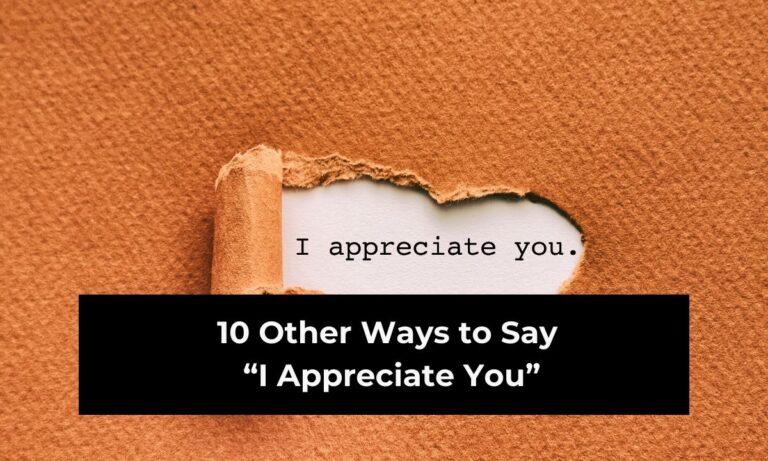There are moments in life when relief washes over you, and the first instinct is to say, “Thank God.” Maybe you narrowly avoided a stressful situation, heard good news, or finally saw something go your way. It’s a phrase we use often, but sometimes you want different words to express the same gratitude, relief, or joy without repeating yourself.
Think about it: language shapes how you connect with others. If you only ever say “Thank God,” it can feel repetitive or even lose its emotional impact. Having a variety of expressions in your vocabulary helps you sound more genuine, heartfelt, and even professional depending on the situation. Whether you’re chatting with friends, writing in a message, or speaking in a formal setting, knowing alternatives can help you choose the right tone.

For example, in casual moments with friends, you might say “What a relief!” But in a professional email, you might lean toward “That’s fortunate.” The words you choose can completely shift the way people perceive your response. That’s why having multiple options in your back pocket is such a powerful communication skill.

In this article, you’ll discover 10 other ways to say “Thank God.” Each one carries a slightly different nuance, so you’ll know when and how to use them effectively. You’ll find alternatives that feel casual and friendly, as well as those that work well in more formal or respectful contexts.
By the end, you’ll not only expand your vocabulary but also feel more confident expressing gratitude, relief, or joy in a way that truly fits the moment. Let’s dive in!
1. “What a Relief”
Sometimes, the simplest way to express gratitude or joy after a stressful moment is to say, “What a relief.” This phrase works especially well when you’ve been carrying tension or worry and then finally receive good news.
Imagine you’re waiting for the results of a medical test, and the doctor tells you everything is normal. In that moment, saying “What a relief” captures the exact emotion you feel—letting go of worry and embracing calm. It’s straightforward, easy to use, and works in both casual and professional settings.
This phrase also resonates in everyday scenarios. Picture being stuck in traffic and worrying about being late, only to find the meeting has been rescheduled. You’d probably breathe deeply and say, “What a relief.” It communicates appreciation for the change in circumstances without directly bringing a religious element into the expression.
The beauty of this alternative is its universality. No matter who you’re talking to, “What a relief” always feels appropriate. It doesn’t sound overly dramatic, and it avoids any chance of offending someone who might not use religious language. It’s practical, polite, and versatile—a great phrase to keep in your everyday vocabulary.
2. “I’m So Grateful”
If you want to emphasize appreciation more than relief, “I’m so grateful” is a perfect substitute. Gratitude carries a softer, more heartfelt tone compared to the urgency of “Thank God.”
Think about situations where someone has helped you through a tough time. Maybe a colleague covered for you at work when you weren’t feeling well. Saying “I’m so grateful” makes your appreciation feel more personal and intentional. It conveys sincerity rather than just a passing reaction.
This phrase also works well in writing. Whether it’s a thank-you note, an email, or even a social media post, “I’m so grateful” communicates genuine emotion without sounding overused. Unlike “Thank God,” which often implies relief from stress, this phrase emphasizes the positive outcome and your recognition of it.
What makes it even better is its adaptability. You can use it in professional environments without hesitation, and it works equally well in close personal relationships. Gratitude is universal, and saying it directly leaves little room for misinterpretation.
Adding “I’m so grateful” to your expressions makes your words feel intentional and thoughtful. It’s not just about acknowledging the situation—it’s about valuing the people or circumstances that made it possible.
3. “That’s a Blessing”
Sometimes, a situation feels so positive that it almost feels like a gift. That’s when you can use the phrase, “That’s a blessing.”
This expression strikes a balance between spiritual gratitude and everyday language. It still carries a sense of reverence without being tied to a specific religious phrase. For example, if a family member recovers from an illness or you find yourself safe after a near-miss accident, saying “That’s a blessing” reflects both relief and appreciation for the moment.
It also works well in conversations where you want to sound thoughtful. Imagine a friend sharing that they’ve landed a job after months of searching. Responding with “That’s a blessing” not only acknowledges their success but also frames it as something truly valuable.
Unlike “Thank God,” which often comes across as immediate relief, “That’s a blessing” suggests you’re reflecting on the situation. It feels a little more profound, as though you’re acknowledging that some moments in life are truly special.
This phrase is warm, empathetic, and uplifting. It can fit comfortably in both casual and slightly formal conversations, making it a flexible addition to your vocabulary.
4. “That’s Fortunate”
If you’re looking for a more polished or professional alternative to “Thank God,” consider using “That’s fortunate.” This phrase captures a sense of relief and appreciation but does so in a way that feels calm, respectful, and appropriate for workplace settings.
For instance, imagine a project deadline is extended after you’ve been stressed about completing everything on time. Saying “That’s fortunate” communicates gratitude without sounding too emotional. It strikes the right balance of professionalism and positivity.
This phrase also works well when you want to acknowledge luck or favorable circumstances without tying it to religious language. You might use it when talking about avoiding a traffic accident, securing an opportunity, or even getting good weather for an outdoor event.
“That’s fortunate” is especially useful in emails or meetings. It expresses relief and positivity but keeps the tone composed and respectful. It shows that you recognize and appreciate the positive turn of events without being overly casual.
When you want an alternative to “Thank God” that feels polished, thoughtful, and versatile, “That’s fortunate” is one of your best options.
5. “I’m Relieved”
Another straightforward alternative is simply saying, “I’m relieved.” This phrase puts the focus squarely on your emotions and communicates how the outcome impacted you personally.
Imagine you’ve been waiting to hear about an exam result, and you finally find out you passed. Saying “I’m relieved” clearly shows the weight has been lifted off your shoulders. It’s a personal way to express that stress has been replaced with calm.
This phrase is also excellent for conversations where you want to be clear about your feelings. For example, if a loved one calls after arriving safely from a long trip, you might say, “I’m relieved you made it safely.” It feels natural, heartfelt, and caring.
What makes “I’m relieved” so useful is its directness. Unlike some other alternatives, it doesn’t leave room for misinterpretation. You’re simply expressing how the situation made you feel. That clarity makes it perfect for both personal and professional communication.
It’s also a phrase that people of all backgrounds can connect with. No matter who you’re speaking to, “I’m relieved” will always be understood as a sincere reaction.
6. “Thankfully”
When you want a short and elegant alternative, “Thankfully” works beautifully. It’s a single word that instantly conveys gratitude and relief, making it one of the most versatile choices.
Picture a situation where you nearly miss your train but manage to board just in time. You might say, “Thankfully, I made it.” It captures the relief of the moment in a way that feels casual but still meaningful.
This word also works wonderfully in writing. In professional emails, you might say, “Thankfully, the issue was resolved before it escalated.” It’s concise, polished, and communicates appreciation without needing extra explanation.
“Thankfully” is also flexible in tone. In casual conversations, it feels warm and natural. In formal writing, it feels professional and respectful. That makes it one of the best replacements for “Thank God” in almost any context.
Adding “Thankfully” to your vocabulary allows you to quickly and gracefully acknowledge relief or gratitude without overcomplicating things.
7. “That’s Wonderful”
Sometimes, instead of focusing on relief, you simply want to highlight the joy of a moment. In those cases, saying “That’s wonderful” is a perfect fit.
Imagine a friend shares exciting news, like getting engaged or being accepted into their dream school. Responding with “That’s wonderful” immediately conveys happiness and appreciation for the good outcome. It’s a warm and encouraging way to celebrate with them.
This phrase is especially helpful in social conversations because it feels uplifting. It emphasizes the positivity of the situation rather than the stress that may have come before it. That makes it slightly different from “Thank God,” which often implies escaping something negative.
“That’s wonderful” also works across different contexts—personal, professional, or casual. Whether you’re responding to an email about good news or chatting with a neighbor, this phrase always feels encouraging and polite.
It’s one of those expressions that spreads positivity. By using it, you not only express your own happiness but also uplift the person you’re speaking with.
8. “That’s a Huge Relief”
Sometimes, the situation is so intense that a simple phrase doesn’t do it justice. That’s when you can use, “That’s a huge relief.” It captures the depth of your emotions in a way that feels authentic and expressive.
Think about waiting for a loved one to come home during a storm. When they finally arrive safely, saying “That’s a huge relief” communicates the weight of the stress you carried and the gratitude you feel now.
This phrase is especially useful in conversations where you want to emphasize just how much the outcome mattered to you. It adds intensity to your reaction without sounding dramatic or exaggerated.
It also works in professional contexts. For example, if a client extends a deadline or an unexpected issue gets resolved, saying “That’s a huge relief” acknowledges the seriousness of the situation while still sounding appropriate.
When you need more than just “relieved,” this phrase helps you express the true depth of your gratitude.
9. “I’m So Thankful”
Similar to “I’m so grateful,” the phrase “I’m so thankful” is another excellent way to show appreciation. The difference lies in tone—“thankful” often feels warmer and more personal, while “grateful” can sound a bit more formal.
Picture spending the day with a friend who supported you during a tough time. At the end, you might say, “I’m so thankful for you.” It highlights not just the situation but also the relationship and your feelings about it.
This phrase also works well in reflecting on broader life moments. During the holiday season, for example, many people use “thankful” to express appreciation for family, health, and opportunities. It carries a heartfelt and reflective quality that resonates deeply.
Unlike “Thank God,” which often emphasizes sudden relief, “I’m so thankful” feels more enduring. It suggests you’re not just reacting in the moment but truly recognizing the value of what you’ve experienced.
It’s a phrase that feels genuine, thoughtful, and uplifting—perfect for personal connections and meaningful conversations.
10. “I’m Glad”
Last but not least, one of the simplest yet most versatile alternatives is “I’m glad.” It works in nearly every context, from casual chats to professional conversations, and it always communicates positivity.
For example, if a coworker tells you they solved a problem you were worried about, you might respond with, “I’m glad to hear that.” It’s supportive, friendly, and acknowledges the good news without sounding too heavy.
In personal conversations, “I’m glad” helps you express care and happiness. If a loved one shares that they’re feeling better after being sick, you might say, “I’m glad you’re okay.” It feels genuine and personal.
The beauty of this phrase is its adaptability. It’s not overly formal, but it’s not too casual either. It strikes the perfect middle ground, making it one of the easiest replacements for “Thank God.”
Sometimes the simplest expressions are the most powerful. With “I’m glad,” you can share relief, appreciation, or happiness in a way that always feels natural.
Conclusion
Saying “Thank God” is a natural reaction in many moments of relief, gratitude, or joy. But as you’ve seen, there are so many other ways to express those same feelings. Whether you choose “What a relief,” “I’m so grateful,” or “That’s wonderful,” each phrase carries its own nuance that can make your words feel more thoughtful and genuine.
Expanding your vocabulary allows you to match the right phrase to the right situation. In casual conversations, something like “That’s a huge relief” or “I’m glad” may feel most natural. In professional contexts, “That’s fortunate” or “Thankfully” might be the better fit. And in deeply personal or meaningful moments, “I’m so thankful” or “That’s a blessing” can carry the heartfelt tone you need.
The goal isn’t to completely replace “Thank God,” but rather to give yourself options. The more choices you have, the more you can express yourself authentically. Words matter, and using the right ones makes your communication more powerful and memorable.
So next time you want to express gratitude or relief, try one of these alternatives. You’ll not only sound more genuine but also create deeper connections with the people around you.
FAQs
1. Why should I use alternatives to “Thank God”?
Using alternatives helps you sound more genuine, avoid repetition, and choose expressions that fit different contexts, whether casual, professional, or personal.
2. Is it okay to say “Thank God” in professional settings?
It depends on the workplace culture. In some environments, it’s fine, but in others, a neutral phrase like “Thankfully” or “That’s fortunate” may be more appropriate.
3. Which alternative is best for formal writing?
Phrases like “Thankfully” or “That’s fortunate” are polished and work well in formal or professional communication.
4. What’s the most casual alternative to “Thank God”?
Expressions like “What a relief” or “I’m glad” are easygoing and perfect for everyday conversations.
5. Can I use more than one of these alternatives together?
Yes! For example, you could say, “I’m so thankful—that’s such a relief.” Combining phrases can make your expression feel even more heartfelt.





